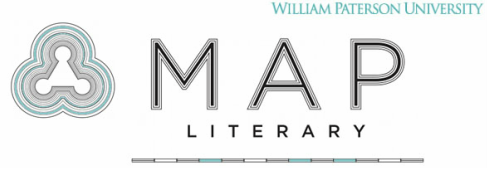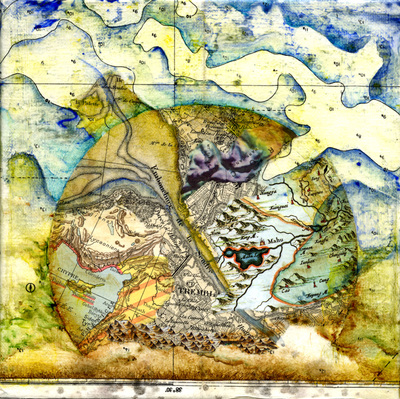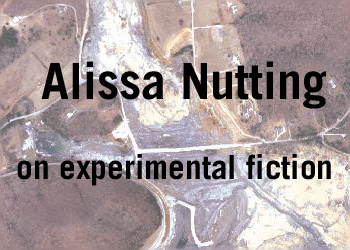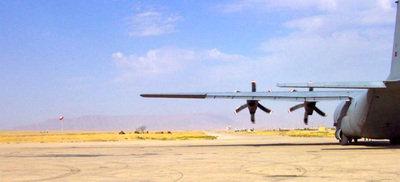ELENA BOTTS
Ode to Oceans
Abstract:
There is no city except a city in fog before anyone. Had woken as the trees moved in an otherworldly breeze. There is no ocean but the ocean. Before anyone was stranded on a distant shore overlooking the bluffs of crazy sorrow. And here is the horizon that first finds the sun and moon as they rise and no stars but these stars as cannot be traced. By anyone. I saw you in a dream but then it was only seeing you in a dream. When still the ghost of you walks this earth.
Body:
We begin by stating (once more) that the ocean is the easiest thing to envision as “the beyond." All of the delegates sat in a circle out on the windy dunes, some half-buried in the sand, others laughing like loons and spinning into the surf. We sat in the sun or sought a beyond in the waves like the way the people come to the beach just to sit facing the surf and sky without a prayer but the prayer of being alive and think nothing of it. We didn't think anything of it. One ambassador asked another if they might have lunch and an NGO intervened to say hello and cast a distrustful eye on their shared national interests. An intern tried to find the right shoes. Of those around him, he thought to himself: “No, I wouldn't say you all are selfish, just absorbed in your own perspectives and motivations. I'd say there's always something to talk about. One can always trace the stars into a constellation, but will it catch on? Will anyone talk about it? And then, will someone fly into outer space with billions of lines of bungee cord and-”
It is a motif in all our lives, the Secretary went on empathetically or perhaps nasally but probably not. He was only talking to the dim thunder of the surf.
He said something like this: “Given the immensity of the ocean, I can hardly think of the loss that our destruction of it represents. But instead of turning away, it becomes all the more important to calculate the effects of acidification, pollution, overfishing, resource extraction, and other human actions. A particular focus of conference is regional consequences for different countries whose representatives are in attendance. There is a portion focused on the Senegalese plan for facing these issues.”
The Secretary reminded us all that he was from Portugal and that Portuguese writer Vergilio Ferreira once had something to say about oceans. What Secretary quoted was that “A language is the place from where you see the World and in which the limits of our thinking and feeling are mapped out. From my language I see the sea.” What he did not say was that “From my language its murmuring is heard, as from others can be heard that of the forest or the silence of the desert. Therefore the voice of the sea has been that of our restlessness.” It wasn't the real words, it was translated, as everything eventually is, into English. Are we made of the contexts we have forsaken? Do we meet here to discuss the world before we go out and find it?
Every country that has a statement on Sustainable Development Goal 14 (it calls for us to “conserve and sustainably use the oceans, seas and marine resources for sustainable development.”) has the right to make a scathing remark about how the U.S. is being an irresponsible bastard when it comes to climate and everyone knows it. Every day, the Americans renew their commitment to a carefully constructed guilt complex that has emerged in the aftermath of withdrawal from the Paris Agreement. We have never been good at national shame, however, so the guilt becomes new fodder for airing our differences and plastering our laptops with stickers just so everyone knows that our allegiance lies not with the USA, nor with any special creed or conviction, but none other than the unimpeachable moon herself which we will soon colonize after we finish untangling Congress, our sense of morality (sometimes referred to as Guantanamo and other times called late stage capitalism, for more information, please take your local epileptic to Times Square), and the Dark Web.
So let's talk acidification, pollution, overfishing, resource extraction, and other human actions (dumping especially), regional consequences for different countries whose representatives are in attendance, and let's see what the Senegalese have to say. Today we are going to affect the lives of everyone on the planet. Don't breathe or let your heart beat too loudly. I've heard that in sacred political spaces, the butterfly effect deafens. Let your heart beat too loudly.
Every organism is, in a way, representative of the whole ecosystem because something that impacts one, impacts all (much like the international system). I think most of us know this. It is hard I think to understand the depth of the human impact on the planet, sometimes I think scientists have only observed a small fraction of our influence. And even that which we have measured and can extrapolate from, in terms of climate change among other phenomena, is difficult to really process. I think it is emotionally numbing for many people to care about environmental problems just because they seem so insurmountable and the average person seems so powerless. However, it is important to overcome this attitude if only because it is through cooperative effort that we can enact real change, and this requires participation from all parties.
And what is the outcome of this? The delegates at the UN Ocean Conference are meant to determine and agree upon a set of voluntary commitments regarding marine life according to Sustainable Development Goal #14.
These commitments are put forward by nations and by NGOs and enacted as initiatives through governments or organizations. It is my personal hope that these initiatives are implemented, and expanded because the ocean is an immeasurable resource and critical for the continuance of that illimitably precious thing, life on earth. "The world’s oceans are key to sustaining life on the planet. They provide a range of benefits for human well-being and prosperity by providing food, jobs, habitats and biodiversity, and by moderating temperatures and capturing carbon."
Later, you’d tell everyone that the greatest thing was the obliteration of sound when you fell into the collision of two oceans, midwinter in Africa. It was a yelling kind of frigid, your whole body syncopated.
Because afterwards, is the storm of doing but for nothing? What is this action plan, this nexus of hope but a ruse to tie us together when we are already tied together, when we are already threaded and indeed tired. "These are the action years’ says somebody," says probably the secretary of something. “This is the best opportunity we will have.” But I see you talking, sir. All I see is you talking. There is nothing happening here, all of the happening happens somewhere else through the efforts of people more committed than these. It is a vast and bureaucratic machine with no sense to soften it.
Suddenly, a group of scientists and researchers descends, all speaking excitedly of mangroves. Flood protection is vital they say, and economically viable. Eastern Caribbean states are especially vulnerable to storms and loss of coral reefs. Still, the Cook Islands might have trouble getting up. He and his people have, he says, “a disproportionate burden."
And when the earth is destroyed, we will not inherit the earth, not even the scientists who were devoted will inherit but one shoreline in the shadow of a great beached whale. If it is as the minister of the Cook Islands has said, even his little heaven shall be underwater.
“Do unto others as you would have them do unto you!” He cries (sixty percent of his own territory is legally protected). The Cook Islands soon hope to transition to all renewables. “You know”, he says, as an aside, “we really do have more water than land.”
There is an actor here and for a moment I'm afraid he was hard to discern from the enthusiasm of the Canadians. He says that he is full of goodwill but that the “g” in “goodwill” is in uppercase. He is positively giddy. He talks for a long time. He says nothing of substance. It is just a hundred flickering signs on the backs of the chairs where it is written: “Save the Ocean.” Maybe this is hopeless optimism. Maybe this is willful pragmatism. Maybe this is all messaging and now that meaning is gone, we're effectively underwater. Maybe this is someone who was commissioned to create ocean-related sculptures outside so now we too must play our part and take pictures of their creative work. It isn't creative work. It's a bunch of waves or something. You act like you're too postmodern for this.
Sri Lanka keeps taking it all very personally, as we all might do if avoiding confrontation regarding the human rights abuses incurred over the course of one's own civil strife.
The Swedish would like some fish. Or they'd like their fish back, which is why they're co hosting and altering their fishing regulations to improve sustainability. Fiji is co hosting because soon they'll have nowhere else to be. All it takes is a few cyclones. Palau and Tuvalu also mention the importance of fishing regulations and indigenous solutions to prevent further “exploitation of international waters.”
The Chinese nodded along like buoys in a harbor. Someone cheerfully metaphorized the stock market, comparing it to a tide, rising and falling.
All of the people of Bolivia came here in one person to fight against “the commercialization of biodiversity” and “capitalism as a threat to the earth that must be broken down.” It's amazing what modernity can do. He thinks we must be the siblings that he lost to imperialism so every day, every hour we must remind him that we are his enemies, that we would like to take his soul and sell it and afterwards eat of the coca leaf too.
Bolivia is getting so tall lately, says one of the five, but finally they decide to maybe help the landlocked developing country renegotiate with Chile for fair sea access. Bolivia is forced to clarify that “brother” is not a pejorative but comes from a place of deep cultural sensitivity. He goes on to explain that not everyone is born rich and that cultural traditional is important to those of indigenous heritage.
Gabonese Republic mutters about “discrimination” and sanctions and the oceans become a thematic backdrop for allegations of vote-rigging. The sea is apparently the new locale for international justice.
If Belgium is in a hurry then is everyone else in a hurry too? No, no one else is in a hurry. Belgium is simply confused. Because it is important that we all sit in a room emailing and texting each other while someone else grants us idealistic colloquialisms about the fate of the world and this is not a circlejerk because in between important meetings we all drift as by osmosis, colliding with one another like random, idea-generating particles. But random doesn't apply here because we are caught and we are each a mess of intentions and I need you to be quiet here for a moment and watch the boats go by in the lounge where no food or drink is allowed so that I can think about the state of our world or maybe just my state afterwards (I must address my constituents somehow, they are more real to me than these walls and these people and these ideas which I cannot fully bear).
After all, when you had first entered the building, did you know that you are inside the inside of everything? You know you must have been here before that time before you were born. Once again it was very quiet and everyone moved like the wind.
It is important that you remember that you are not a real person. It is good that way, no one will see you. You are a political entity and should act as such. It is perfect; every bit of the space has meaning but no one knows what it is. It's like a song that you make up as you go along, except that no one is singing anything, at least until some Pacific Islanders came to the front and howled in song and it was the most beautiful thing about it. Come to think of it, you're all alone. Only Pachamama is watching.
A man with a vacuum emerges around the corner and vacuums all around but not under your feet. You avoid one another's gaze. There is a solitary ship on the East River, dim lit bulbs strung at its helm. A diplomat watches as you pass, evaluating the import of your step. You say you have no message but the words stick in your breath. This is the part of the story where- “she's trying to feed dragging the dead calf after her”- marine life suffers and dies due to discarded fishing gear soon to be followed by a teary-eyed conservation society proclaiming that greater fishing regulation is necessary for the health of our oceans.
If you were a real person, you know what you would do. First, you would get a new shirt. Then you would recycle, but really recycle, not only cans and jars or nets and plastic bags (floating like death for the mammals to bite into, floating like manufactured ghosts, on the high seas, floating), recycle all the great sorrow of the people and the earth (as though in some implicit suicide pact, we fall, by warming, we lose even our essence and are melded together in that final hour, maybe even wading through a rising ocean, and scarcity was uncompelling and in the end we didn't know what it meant to be human, we just knew that we were dying if we didn't find out) and turn it into something compelling like a solution or as they call it lately, these days, a multilateral agreement, like a great something (beached whale?) between nations.
Finally, you would ride on a foreign minister's back like a strange monkey from far away. You would say hello to everyone that you saw in the hallway. It is not impractical to address every single human being here, it is like playing god without being divine and especially without any pride. In the morning, you wake with the realization that we sprung from the womb as fully formed solutions. Surely, we could write the whole thing off to existential rot. Surely we could say whose bright idea was existence anyway? To hell with the oceans! To hell with her that is like my mother and my father and my whole world, all that I have ever loved.
Yeah I care what the ocean thinks. The real problem here is that there is no wind inside the building. It is not like we went into the great wood and oh goodness it breathed, those stormy trees and a weighted breeze rippling the solid calm of lake. Here I can only beg you not to speak so quietly when all lives bend to the water but you do, oh you do. The united nations climbed a tree, fallen as it was and each spoke of how everyone was restrained in a mighty fear, like something that could not be named so we named it and the world shook out from under us until we entered the old earth.
Let's be judicious. Let's have a council. Let's prepare statements while we sit on airplanes or jets shooting across the sky like renegade falling stars that somehow, and to find fuel, to combust and propel oneself from a thousand foreign countries, immersed as we all are, after all, in the oceans. This all makes so much sense we don't have to say it aloud. We'll say it aloud anyway, loudly and ad nauseum. Did anyone forget that we are here to, in fact, save the oceans? We're here to save the oceans. We're here and we're naked and we want more than anything to gird ourselves in compliance and measures to limit pollution from industry and eventually we would like to succumb to the formalization of an international system that seems so increasingly unsteady like, forgive me, a captainless rudderless ship sailing out between the dead buildings of New York City.
And in ghost-walking the city one recalls that there are many organisms that think they are separate organisms. If the nations are united then is this just another city? No, because no one is eating here and no one is sleeping here but mostly no one is knowing here another thing, for what it is. It is inescapable, New York, as we walk into a unseasonable temperature, passing security guards who ask if we are okay or perhaps feeling a bit under the weather today.
Addendum:
I keep thinking about the ruler of the universe, you know the one who controls the aquatic symphonies, the tides. He has a cat, a gingery thing that will leave his side and often but somehow remains like a piece of his face only you wouldn't think of his face you'll never remember his face quite even after you've met him and maybe it's this way for a lot of people but for some reason. His face makes you remember a lot of things but these are as unspeakable as the planet in its slow revolutions of the sun and nothing ready to the mind, you cannot speak.
He lives in a small house. Here there is a table and a cat, a gingery thing that eludes him somehow more or less than all the ether that he cannot convince himself is real. He doesn't believe in anything, he says. Most especially not himself and that is why I recall him so fondly, perhaps he is a generation of my own eroding. Maybe it is fond to know little or nothing or perhaps it is endearing to us who know mostly of failings and less of things that stick and stick and stick like stars or even the constellations of skin, so fixed is my vision on impermanence, so broken my bones by merely the thought of it and breath just another thing to carry me out of this world. Had I known myself enough here to know this place.
He lives by the sea, but we all do in our minds, anyway, ourselves forever wading or cresting. It depends on whether we are in it or of it, whether we could know it, or even the moon. He has a face like the moon and he breathes a cosmic wind that floats down and flutters us, our bones, our terrible unshakeable hearts that we do anything and everything to annihilate. As oblivion was the first true love.
When you embrace the ruler of the universe, he only shivers and admits that he doesn't know if he exists, let alone if there is a universe. The others often aim at convincing him, that yes, there is great care in the cosmos, even rabid desire and the minds of animals, even the salivating human animal, and that the spinning suns burning out implode for something after all, even the nethers of us. But he is. The cat has lost itself in the wave but pads out again, slim flank and a trim fish in mouth or maybe an imaginary fish, a scintillating thing that the felid devours madly, streaking the bones and ravening. They comfort the body of the ruler, hold him tight though he is unmoved, moves little. His body doesn't speak fathoms and his eyes are forgettable to each of us. We hold him like nobody until we are released. He smiles at us and says he will soon return to his little shack on the rim of the great ocean on this planet that is smaller than most but on which he is lonesome, that is if one can be alone, that is if he is what he is and there is a shack crumbling and an ocean also and a rim of all things, though he says, and scuffles a foot into a dune, I cannot suppose that is so. I do not know.
Copyright © February 2019 Elena Botts

Elena Botts grew up in the DC area, lived briefly in Berlin and Johannesburg, and now attends college in upstate New York and NYC. She is a poet, writer, and artist. She has been published in over a hundred literary magazines over the past few years. She has won four poetry contests, including Word Works Young Poets'. Her poetry has been exhibited at galleries in the Hudson Valley and DC areas, as well as across the country. Check out her poetry books, we'll beachcomb for their broken bones (Coffeetown Press, 2015), a little luminescence (Allbook-Books, 2011), and the sadness of snow (Transcendent Zero Press, March 2017). Additionally, her visual art has won several awards. Go to elenabotts.com for more information or o-mourning-dove.tumblr.com to see her latest artwork.









